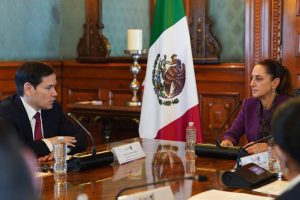 -Editorial
-Editorial
The United States and Mexico announced a new phase of security cooperation, unveiling a high-level group to coordinate action against drug cartels, arms trafficking, and irregular migration while pledging to balance enforcement with respect for sovereignty.
The announcement came during Secretary of State Marco Rubio’s visit to Mexico City, where he met with President Claudia Sheinbaum and Foreign Secretary Juan Ramón de la Fuente. Both governments said the framework reflects an unprecedented level of coordination in recent months, crediting it with reductions in fentanyl seizures, extraditions of criminal suspects, and fewer migrant encounters at the U.S.-Mexico border.
“This is an important and significant day in the relations of our two countries,” Rubio said. “Never in the history of both countries have we seen the level of cooperation we have right now.”
Under the new mechanism, U.S. and Mexican agencies will coordinate law enforcement and intelligence operations, strengthen border enforcement, and pursue transnational criminal networks. The group will also address arms smuggling, financial crimes, and what officials described as emerging threats such as drones being weaponized by organized crime groups.
Rubio said the United States would involve agencies such as the FBI and the Bureau of Alcohol, Tobacco, Firearms, and Explosives in the effort. He stressed that security challenges required joint action. “When you talk about cartels and other groups operating across the hemisphere, our countries are stronger when we work together,” he said.
De la Fuente said the framework will provide structure, accountability, and follow-through. “This is not about subordinating one country to another,” he said. “This is about establishing mechanisms that can produce tangible results in a relatively short period of time.”
The talks placed fentanyl and migration at the center of the bilateral agenda. U.S. officials say fentanyl, largely produced in Mexico with precursor chemicals from Asia, is the leading cause of overdose deaths in the United States. Mexico, meanwhile, has pushed Washington to curb the flow of firearms south, saying American weapons fuel cartel violence.
De la Fuente noted that Sheinbaum’s government has made fentanyl trafficking a constitutional crime and that legislative reforms are underway to tighten enforcement. He also pointed to recent reductions in migrant crossings. “Since October 1, when this government began, border encounters have dropped by more than 90 percent,” he said.
Rubio credited Mexican authorities with disrupting trafficking operations and facilitating the extraditions of cartel leaders. “Dozens of high-value targets have been turned over to U.S. authorities in recent months,” he said. “That level of cooperation saves lives on both sides of the border.”
The visit was overshadowed by questions about a U.S. military strike earlier this week on a vessel in the Caribbean that officials said was carrying drugs for the Tren de Aragua criminal group. The strike destroyed the vessel, but Washington offered few details.
Rubio defended the operation, calling it part of President Donald Trump’s campaign against what he has labeled narcoterrorist organizations. “What will stop them is when you blow them up,” Rubio said, adding that such actions could continue if criminal groups operate on the high seas.
De la Fuente, pressed on concerns in Latin America about a return to “gunboat diplomacy,” reaffirmed Mexico’s constitutional principles. “Our foreign policy is based on self-determination, nonintervention, and the peaceful solution of problems,” he said. While not directly criticizing the strike, he emphasized that Mexico’s cooperation with the U.S. would remain guided by those principles.
Both officials highlighted arms trafficking as a critical challenge. Rubio said criminal groups in the region were acquiring military-grade rifles, explosives, and drones. “They are beginning to use drones in ways that could threaten not only law enforcement but civilian populations,” he warned.
De la Fuente said Mexico has taken steps to track and seize weapons while pushing for stronger U.S. enforcement at the source. “We cannot succeed in fighting cartels if weapons continue to flow south in such large numbers,” he said.
Both governments framed recent developments as evidence that cooperation is working. De la Fuente said fentanyl seizures had dropped by 50 percent in recent months and that homicide rates were declining in several Mexican states. Rubio pointed to the disruption of cartel networks and a decrease in migrant encounters at the U.S.-Mexico border.
Officials said the new high-level group will meet quarterly to track progress, ensure accountability, and coordinate strategies. It will include cabinet-level participation from both sides.
In a statement on X, President Claudia Sheinbaum said the agreement reflected months of preparation and would be guided by clear principles. “During the cordial meeting with U.S. Secretary of State Marco Rubio, we agreed on the cooperation program on border security and law enforcement, after several months of work,” she said. “It is based on four axes: reciprocity; respect for sovereignty and territorial integrity; shared and differentiated responsibility; and mutual trust.”


